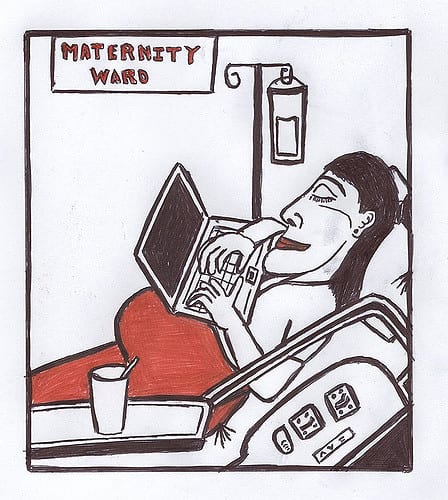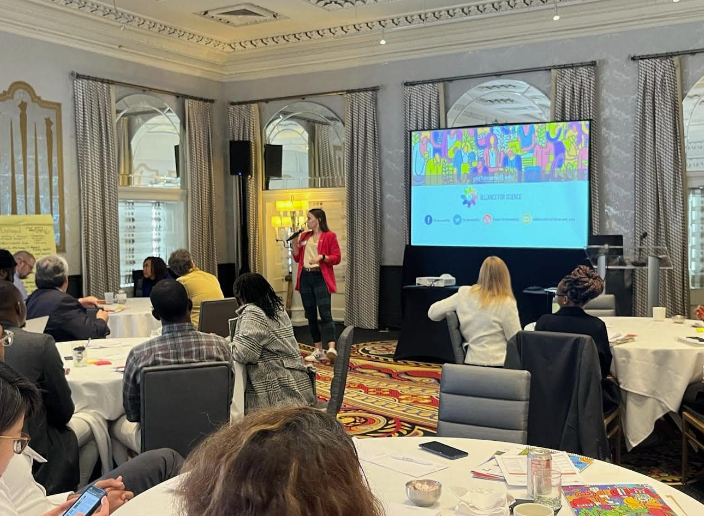
In recent decades, we have seen an increase in women holding STEM related careers. Today, 25% of workers in STEM fields are female. It is time to begin the conversation on how policies, whether at the institute level or federal level, are going to affect our growing workforce of women. Although reliant on the growing family, the United States leaves much to be desired in the way of maternity leave. The United States is one of few nations that does not mandate paid parental leave, leaving the option of offering paid parental leave up to the workplace. Some states such as California, New York, New Jersey, and Rhode Island have mandated paid parental leave but these states are the exception to the norm. Enacted in 1993, the Family and Medical Leave Act (FMLA) allows eligible employees to take 12 work weeks of unpaid leave after the birth of a child within a given year, but 40% of workers are not eligible for FMLA benefits and only 45% of women in the workplace have reported receiving any pay during maternity leave since 1994.

Looking closer to home (or the arch for that matter), the University of Georgia has some unclear policies regarding maternity leave for faculty and graduate students. According to information provided by the Human Resources department for faculty members, expectant and new parents may “be able to use some combination of paid sick leave, paid annual leave, leave without pay, and/or short-term disabilityâ€, depending on the situation. Upon further research, eligible employees may be able to use their accumulated sick leave for maternity leave. At first glance, this may provide relief for some, but after looking into the sick leave policy of UGA, it becomes evident that this policy insufficiently meets the need of expecting women in STEM. The amount of paid sick leave a person accumulates depends on how much they work within a month; even by working 40 hours per week, the most an individual can obtain a month is 8 hours of paid sick leave. For people who plan their pregnancies months in advance, they may be able to accumulate enough paid sick leave for their entire 12-week or more maternity leave. On the other hand, individuals with an unexpected pregnancy can at most accumulate 72 hours of paid sick leave in the 9 months between conception and birth. For those who don't have a calculator handy, 72 hours is equivalent to only 1.8 work weeks, which is far short of the 12-week maternity leave period.
While arranging maternity leave can be difficult and unsatisfactory for faculty, it is a nightmare for graduate students. According to UGA, one of their primary objectives regarding parental leave for graduate students is “[to] affirm UGA's commitment to supporting women and families, particularly those who experience pregnancy and childbirth or adopt a young child while pursuing a graduate degreeâ€. Based on the stories we have been hearing from graduate students across campus, this objective has been grossly unfulfilled. Graduate students can “pause†enrollment at UGA up to 3 semesters, but they may not partially complete the semester and then leave. In particular, one graduate student's due date was June 21st, but she was told she would have to take the entire Summer semester, May through July, off. For many graduate students, their enrollment determines their income, access to UGA services, and health insurance. Taking a semester off to give birth (a costly venture of ~$7,000 for a non-complicated vaginal birth) means losing security and access to affordable healthcare, a necessity for new mothers and infants. When another graduate student addressed these concerns with the HR department, they were simply told to try to “stick it outâ€. She received the same advice from her advisor and when faced with losing her job and benefits; she was advised to forgo maternity leave. Two weeks after birth, she returned to school and work, losing the experience of crucial bonding time that comes with spending one on one time with your baby immediately after birth.
Every now and then, a student or faculty member can catch a break. This all depends on their department's generosity, however. For the student due to give birth June 21st, her research advisor was very generous and approved 6 weeks of paid leave instead of forcing her to put a hold on her enrollment and forfeit her benefits. This is entirely up to the PI of the lab, and not all STEM graduate students could be as lucky. Regardless of their experience with maternity leave, all students and faculty members who lent their input into the subject agreed that UGA childcare services are lacking. Not a single person was able to use childcare services on campus due to the extensive wait list, inability to sign up for the wait list until after birth, and high cost. All agreed that they believe UGA should increase access to affordable childcare by reducing the cost and wait list for on-campus services.
With more women joining the workforce and specifically STEM fields, policies should reflect value for their employees and their employee's rights as new parents to bond and nurture a new child without repercussions. It should not have to be a choice between being a mother and being a working professional. Relating back to an adage my mother used to tell me (with some minor tweaking), women should possess the right to have their cake and eat it, too. With major policy changes at the university, state, and federal level, we can.
Interested in getting involved? Women in Science, a local UGA organization committed to empowering women in STEM, will be hosting a general body meeting October 4th, 2018 at the Science Learning Center on main campus at 5:00 pm. Any and everyone are welcome to attend, mingle, and grow!
 Adrianna Westbrook is on the executive board of the Women in Science UGA chapter as the Undergraduate Liaison. There, she works to build a UGA-wide community of scientists interested in promoting equality in the sciences by offering opportunities for mentoring, networking, and career development. You can find more of her work here.
Adrianna Westbrook is on the executive board of the Women in Science UGA chapter as the Undergraduate Liaison. There, she works to build a UGA-wide community of scientists interested in promoting equality in the sciences by offering opportunities for mentoring, networking, and career development. You can find more of her work here.
About the Author
-
athenssciencecafehttps://athensscienceobserver.com/author/athenssciencecafe/April 17, 2020
-
athenssciencecafehttps://athensscienceobserver.com/author/athenssciencecafe/April 12, 2020
-
athenssciencecafehttps://athensscienceobserver.com/author/athenssciencecafe/April 3, 2020
-
athenssciencecafehttps://athensscienceobserver.com/author/athenssciencecafe/March 30, 2020







